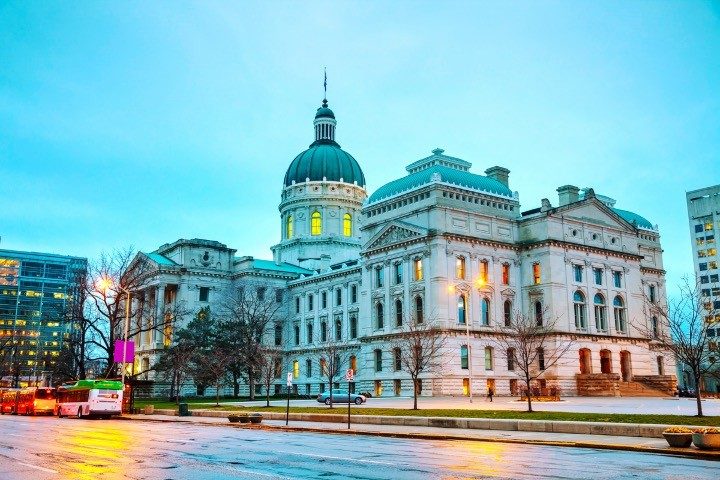
The Indiana Senate passed a bill that would ban nearly all abortions at all stages of pregnancy. Reconvened in a special legislative session on Saturday, the senators passed Senate Bill 1 (SB1) in a 26-20 vote, with four abstentions.
In its current edition, the bill makes it a Level 5 felony for a physician to abort a baby unless it is medically necessary to save the mother’s life or the pregnancy was the result of rape or incest. Even in those cases, abortion is restricted to the first 12 weeks for girls aged 15 or younger and the first eight weeks for women aged 16 or older. In the case of rape, there must be a signed affidavit attesting to the crime, per the bill.
Under Indiana law, Level 5 felons face a prison sentence of between one year and six years, with a maximum fine of $10,000.
As seen from the livestream of the hearing, nearly inaudible amid the chants of the protesters just outside the chambers, Senator Sue Glick (R), who authored the bill, said that the goal of the legislation was to “protect as many people as possible,” when asked about the bill by the Senate Minority Leader Greg Taylor.
In a statement following the vote, Senator Glick called the measure a “huge step forward in protecting the life of the unborn children in our state” that is “fair and just.”
“We have put together a bill that would not criminalize women and would protect the unborn whose voices have been silenced for the past 50 years under Roe v Wade,” Glick added.
While the senator signaled that women should not be held legally accountable for the decision to terminate their pregnancies, some conservatives believe otherwise, presenting valid arguments in their support.
“If a mother took her newborn child to someone to be killed, we would all acknowledge that it would be complicity in a homicide. Complicity in abortion should be treated no differently,” reads a recent opinion piece at The New American.
Back to Indiana, speaking about the disagreements over abortion with Democratic Minority Leader Greg Taylor, Glick underlined that many Hoosiers, including those in the state Legislature, would welcome even more restrictive measures.
Senator Taylor, in turn, issued a statement condemning the bill and expressing his hope that the House legislators would have “more compassion and love in their heart” and would “kill this dangerous bill.” In a communication with The New American, the senator’s office reaffirmed his staunch opposition to the bill, saying it was “about control and not life.” The office did not immediately respond to the question on whether the unborn babies deserve the legislators’ compassion.
On Thursday, eighteen Republicans voted in favor of an amendment removing the rape and incest exceptions, while as many joined the Democratic caucus to keep them.
The proposal to reject the exceptions followed a media outcry over the story of a 10-year-old rape victim who traveled to Indiana from neighboring Ohio to end a pregnancy. The story was first reported by the Indy Star.
The alleged case gained national attention when an Indianapolis doctor said the six-week-pregnant Ohio girl had to travel to Indiana because a newly imposed Ohio law prohibited an abortion if a baby’s heartbeat is detected. The case was quoted by President Joe Biden as an argument for “protecting the access to abortion.”
Senator Michael Young (R), who authored the failed amendment, urged his colleagues to protect the lives of those babies who were conceived as a result of rape or incest. “When we have exceptions, that equals death,” he said on the Senate floor.
Overall, the narrowly passed bill was met with mixed reactions from both supporters and opponents.
Right to Life Indiana pointed out in its official statement that, among other things, the legislation was “weak and troubling” since it failed to provide any “meaningful enforcement provisions.”
“This bill goes through the motions on paper, but lacks any teeth to actually reduce abortions in Indiana by holding those who perform abortions or would intentionally skirt the law accountable with criminal consequences,” said the organization.
At the same time, the pro-abortion Democratic senators slammed the bill for being extreme; stripping a woman of her right to choose; traumatizing women, their families, and healthcare providers; and destroying women’s freedom and free will.
The bill is now heading to the House, which is occupied by 71 Republican and 29 Democratic representatives. The House went back into session on Monday afternoon, and referred the bill to the Committee on Courts and Criminal Code. The House is expected to vote on the bill by the end of the special session, which ends on August 14.
Indiana Governor Eric Holcomb previously called for the General Assembly to act on restricting abortion rights in the state. In his statement on the Supreme Court overturning Roe v. Wade, Holcomb reaffirmed his commitment to protecting the lives of the unborn: “I have been clear in stating I am pro-life. We have an opportunity to make progress in protecting the sanctity of life, and that’s exactly what we will do.”
This latest bill makes Indiana the 13th state to attempt to make abortion a felony. Similar laws were already put in place in Arkansas, Idaho, Kentucky, Louisiana, Mississippi, Missouri, North Dakota, Oklahoma, South Dakota, Tennessee, Texas, and Utah. In those states, the legislators adopted so-called “trigger laws,” or abortion bans designed to go into effect when Roe v. Wade was overturned on June 24.




